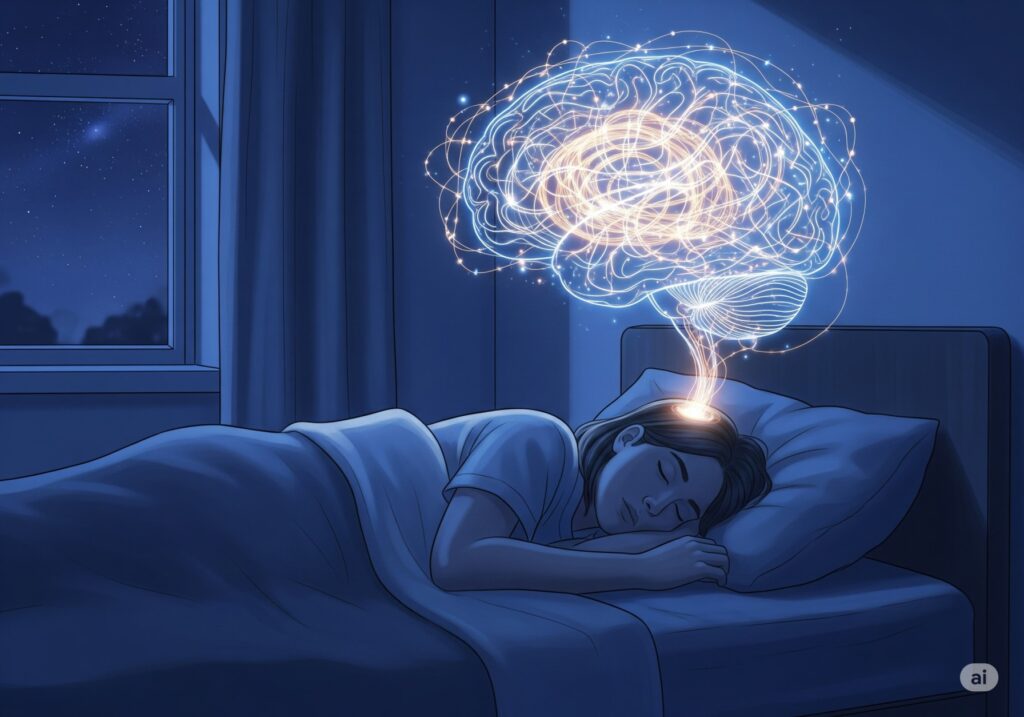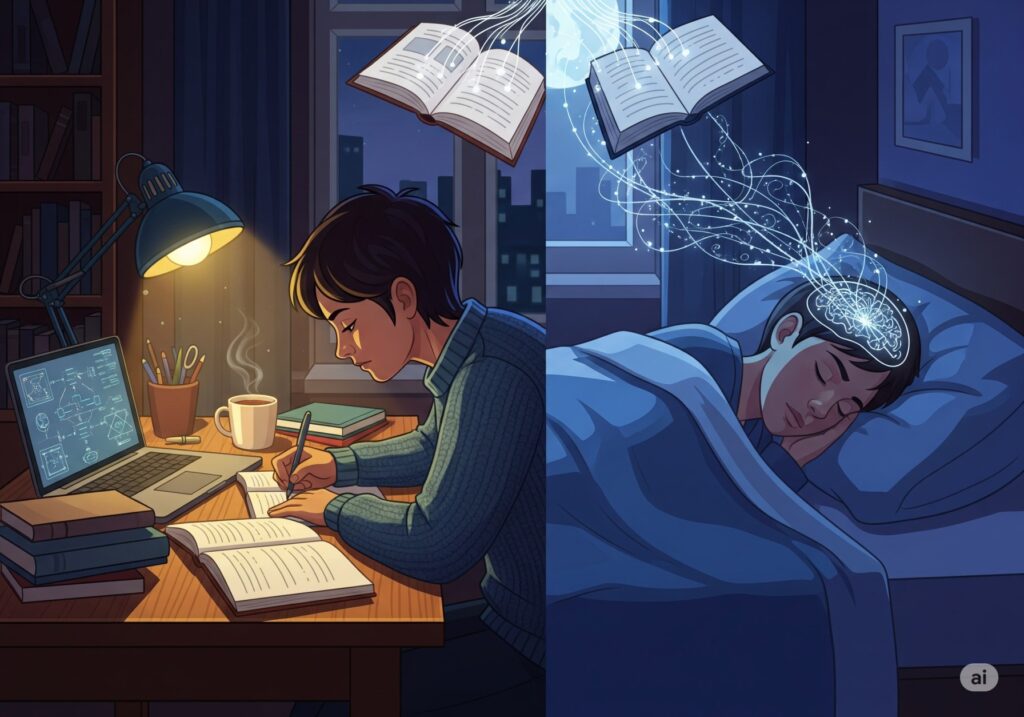
Sleep for better memory with brain pathways forming during rest
Discover how sleep for better memory boosts learning, cleans the brain, and locks in skills—plus simple habits to sleep smarter tonight.
Why Sleep for Better Memory Is Your Secret Weapon
Good sleep doesn’t just rest your body. It trains your brain. In fact, sleep is when memories are sorted, strengthened, and stored. Therefore, if you want to learn faster and remember longer, you need to treat sleep like study time for your brain. Researchers even call sleep a key part of “memory consolidation,” the process that turns fresh experiences into lasting knowledge. ScienceDirect, Nature
How sleep for better memory actually works

During the night, your brain cycles through stages. These include non-REM (light and deep slow-wave sleep) and REM (dream sleep). Each stage helps memory in different ways. For example, non-REM—especially deep slow-wave sleep—supports facts and vocabulary. Meanwhile, REM often helps integrate skills and emotional memories. However, both stages likely work together across the night. magazine.hms.harvard.edu, Harvard Health
Inside those stages, special brain rhythms do the heavy lifting. Slow waves, sleep spindles, and hippocampal ripples “replay” fresh memories. Because of this replay, fragile new traces become stable and linked to what you already know. Recent studies show that slow-wave–spindle coupling and thalamo-cortical synchrony are central to this memory upgrade. Nature+1
The role of spindles in sleep for better memory
Sleep spindles are brief bursts of brain activity during non-REM sleep. They act like delivery trucks, moving information from the hippocampus (short-term storehouse) to the cortex (long-term storage). In meta-analyses and lab studies, more robust spindles are linked with stronger next-day recall and better motor learning. Consequently, protecting spindle-rich sleep can pay off for students and professionals alike. ScienceDirect+2
Sleep for better memory also cleans the brain
There’s another superpower at night. While you sleep, the brain’s “glymphatic system” opens up. It flushes waste like beta-amyloid, which can build up when you’re awake. This nightly rinse lowers neural “noise” and keeps circuits ready to learn again tomorrow. Although scientists continue to refine the details, the overall picture is clear: sleep supports cleanup that benefits cognition and memory. PMC+1, National Institutes of Health (NIH)
What happens when you skip sleep?
Even one bad night can hurt memory. New evidence shows that sleep loss disrupts the prefrontal cortex’s ability to control what you remember or forget. As a result, intrusive or unwanted memories become harder to suppress, and recall gets messy. Over time, chronic sleep debt further weakens focus, learning, and retrieval. PNAS, PubMed
Which memories benefit most from sleep for better memory?
Sleep doesn’t boost all memories equally. Often, it prioritizes what matters—new, emotionally charged, or hard-won information. For instance, experiments suggest that sleep can selectively strengthen emotional parts of an experience. At the same time, ongoing research indicates complementary roles for slow-wave and REM sleep in shaping, and sometimes even trimming, emotional memories. PNAS, Nature
Can you guide the brain during sleep?
Intriguingly, scientists can “nudge” consolidation with gentle cues. A method called targeted memory reactivation (TMR) plays subtle sounds tied to a learning task while you sleep. Then, the brain replays those memories more strongly, especially during slow waves and spindles. It’s not a consumer tool yet, but it underscores how sleep is an active, tunable learning state. Nature
A simple plan: habits that help with sleep for better memory work

You don’t need gadgets to benefit. Instead, use these practical steps to help your memory tonight:
- Protect 7–9 hours. Most adults need this range. Consistency matters more than perfection. Go to bed and wake up at similar times, even on weekends. Harvard Health
- Front-load learning. Study and practice earlier, then review before bed. Consequently, your brain can replay fresh material during the first deep-sleep cycles. magazine.hms.harvard.edu
- Mind evening inputs. Caffeine after mid-afternoon, heavy meals late at night, and bright screens can delay or fragment sleep. Therefore, cut them down after sunset.
- Make a wind-down buffer. Try 30–60 quiet minutes. Read paper pages, stretch lightly, or journal. Because stress blocks sleep, this transition helps you fall asleep faster.
- Keep it cool, dark, and quiet. Aim for a slightly cool room, blackout curtains, and reduced noise. Small changes compound.
- Move during the day. Regular exercise improves sleep depth and quality. However, avoid intense workouts in the last hour before bed.
- Treat snoring or apnea. If you gasp, wake unrefreshed, or feel very sleepy in the day, talk to a clinician. Untreated sleep disorders can derail memory gains. Harvard Health
Study smarter with sleep for better memory
- Interleave practice. Mix problem types. Then, sleep helps your brain find patterns.
- Space sessions. Short, frequent sessions beat cramming. Because sleep stitches each day’s learning together, spacing multiplies the effect.
- Test yourself. Retrieval practice builds stronger traces before your brain consolidates them overnight.
- After hard practice, prioritize sleep. When skills are fresh, the next night’s spindles and slow waves likely reinforce those circuits. Nature
Key takeaways
Sleep isn’t downtime. It’s an active workshop where your brain files facts, polishes skills, and washes away clutter. Therefore, if you care about learning, creativity, or performance, guard your nights. With a few steady habits, you’ll remember more—with less effort.
Reading and source links
- Harvard Health—Sleep stages and memory (overview for readers) Harvard Health
- Harvard Medicine Magazine—Sleep melds memories (plain-language explainer) magazine.hms.harvard.edu
- Nature Neuroscience—Coupled slow oscillations, spindles, and ripples (mechanisms) Nature
- Nature—Hippocampo–thalamocortical synchrony supports memory (human evidence) Nature
- Meta-analysis—Spindle-dependent memory consolidation (healthy adults) ScienceDirect
- NIH/PMC—The glymphatic system and sleep (brain “cleaning”) PMC+1
- PNAS 2025—Sleep deprivation impairs memory control (new findings) PNAS, PubMed
- Science of Learning (Nature)—Targeted memory reactivation (personalized TMR study) Nature
Medical Disclaimer: This article is for educational purposes only and is not a substitute for professional medical advice, diagnosis, or treatment. Always consult a qualified healthcare provider with any questions you may have about your health or before making changes to your diet or lifestyle.
Call to Action: If you found these tips helpful, share this article with friends and family. For more science-backed health insights, explore our latest blogs on Nowspress.





